Jolie’s Sensory-Led, Scientifically-Backed Design Approach Transforms Their Central Manchester Workspace
International design studio Jolie, led by Design Insider Ambassador Franky Rousell, has expertly transformed their central Manchester workspace into a sensory-led haven. This remarkable redesign not only showcases the studio’s interior expertise but also underscores their unwavering commitment to ‘sensory-balanced’ design principles. By applying their signature approach to their own workspace, Jolie has meticulously crafted each distinct area, prioritizing a thoughtful and scientifically-driven office redesign. The result is a socially sustainable and adaptable environment that fosters interaction and connection, addressing the present and future needs of their team.
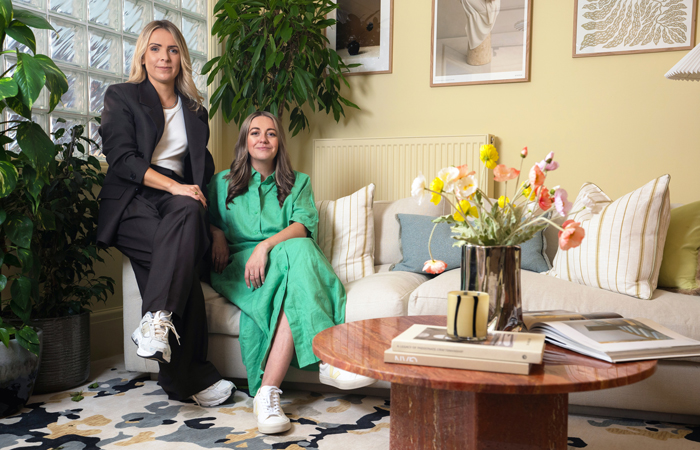
The psychology of colour
A sensory approach to interior design combines materials, colours, fragrances and sounds to create immersive, multi-sensory experiences in every space, and is achieved by incorporating scientific sensory research to emotionally drive people in their environment. In interior design, everything starts with visual aesthetics, which is most frequently interpreted as “how things look,” rather than considering the psychological impact this may have. “Colour is intrinsically linked to the psyche,” says Jolie CEO and Founder, Franky Rousell, “and plays a huge role in helping to define a person’s mood. Different hues and shades can make people feel creative, reduce anxiety, calm or motivate them. When used correctly and striking an optimal balance, colour has an incredible potential to influence how an end user feels and behaves in a space.”
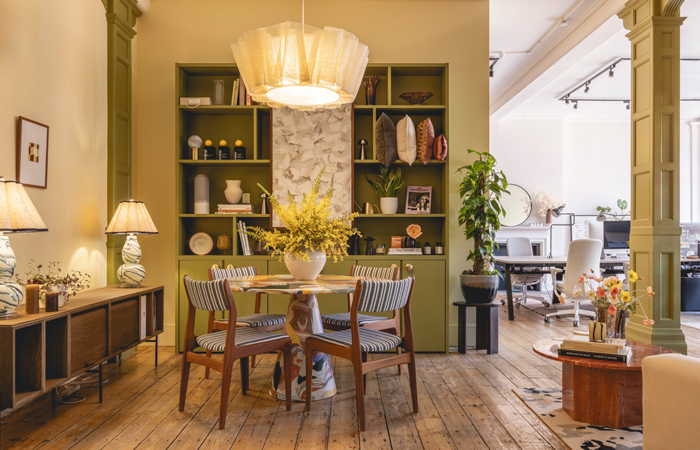
In their desire to curate a palette of paint colours that would evoke productivity, creativity and a harmonious atmosphere within their studio space, Jolie has collaborated with COAT; a B-Corp brand that delivers high-grade climate positive paints to both the trade and consumer sectors. The ‘JOLIE edit’ comprises four carefully considered paint colours from COAT’s trade palette which Jolie believes would work equally well in both a corporate or a residential workspace environment. “These four colours carry tangible benefits for any office space, inviting clarity and focus, promoting growth and refreshment, igniting innovation and energy, and establishing a sense of balance,” says Rousell.
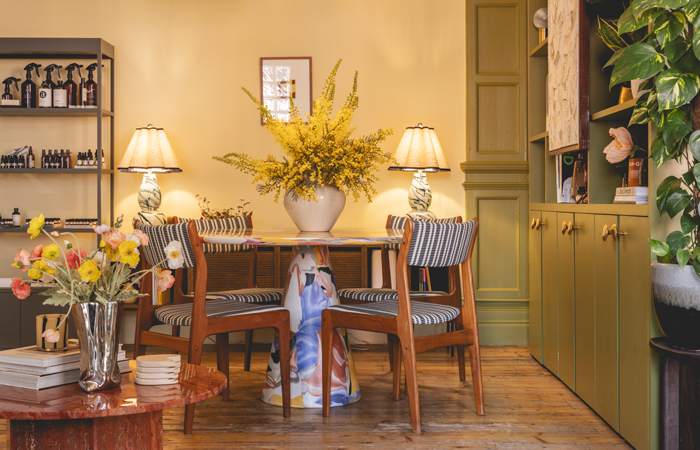
Upon entering the Jolie studio, guests are welcomed by a beautiful buttery yellow tone (JOLIE 8149-1). “We wanted everyone to feel really positive,” explains Rousell, “whether they are clients or part of our day-to-day team. This vibrant hue stimulates the visual sense, evoking a feeling of warmth and energy, and sets the tone for a productive environment.” Transitioning further into the studio space, guests are met by a beautiful and striking bespoke joinery piece painted in a fig leaf green hue (JOLIE 8727-5); which forms a stunning backdrop to the Melting pot table by Dirk van der Kooij, around which the team regularly meet for creative problem solving sessions. “This earthy green hue represents growth and creativity,” explains Rousell, “instilling a harmonious ambiance in the space that engages both the visual and tactile senses, and fosters a serene and rejuvenating atmosphere. It reminds us of the beauty of nature, with its calming effect and connection to the outdoors.” Tapping into the benefits of biophilic office design, working in this space helps to promote curiosity and more explorative ways of working, helping to bolster the team’s creative approach to client schemes and projects.
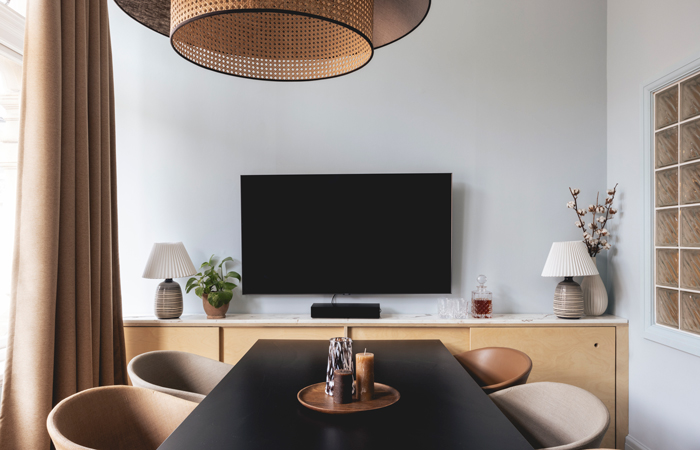
In the studio’s meeting room, Jolie faced the challenge of working with an abundance of natural light, which filters in through large windows across the entire left hand side of the room. “We wanted to find a light blue that could withstand the room’s brightness without appearing washed out,” says Rousell. “We needed it to provide clarity and focus, while avoiding any sense of coldness or anxiety.” Being intentional when selecting colour tones is key, and needs to strike the right balance between the available light source and the intended function of a space. The light blue hue Jolie settled on (JOLIE 8486-1) engages the senses by creating a calm and focused environment, supporting the room’s main role as a client meeting space for project pitches and updates, and complementing the terracotta brick of the exterior and the orange tones within the lighting scheme.
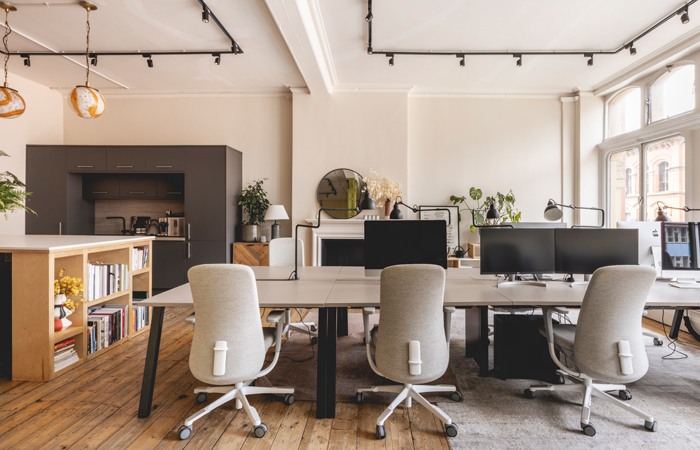
At the back of the studio, where the team spend most their time working at their computer screens, Jolie opted for a welcoming but slightly muted, chalky beige tone (JOLIE 9037-1). It was also important to promote a neutral canvas for the material library, so fabrics could be paired and contrasted for client schemes without any external colour interference. “We wanted to create a sense of warmth and inspiration here,” says Rousell, “in a space that envelops and nurtures our designers. It needed to feel light, fresh, and inspiring, allowing our team to seamlessly blend various colours in their design process without conflict.”
The senses combined
While colour has played a huge role in the Jolie studio redesign, the remaining senses of touch, scent and sound were also carefully considered. Material consideration throughout the space was key. Jolie opted for solid brass handles on the bespoke joinery piece to connote luxury in a space where social connection and creative thinking are encouraged.
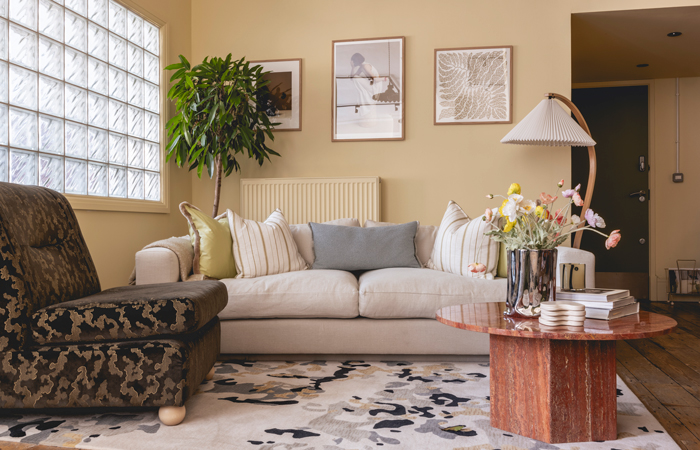
In the lounge area, where the team might break for a coffee or catch up socially with clients or suppliers, feather filled cushions have been used to promote relaxation and wellbeing, with a plush tactile rug underfoot – with an organic pattern designed by Jolie and made by Sacco – that encourages team members to kick back and make themselves at home in the space. Smell is a sense often overlooked in interior design, but as the strongest sense it forms a crucial element of Jolie’s experiential approach to spacemaking. Located at the front of the studio, Jolie’s ‘scent laboratory’ houses their collection of essential oils and fragrances which they combine to create bespoke scents for client projects.
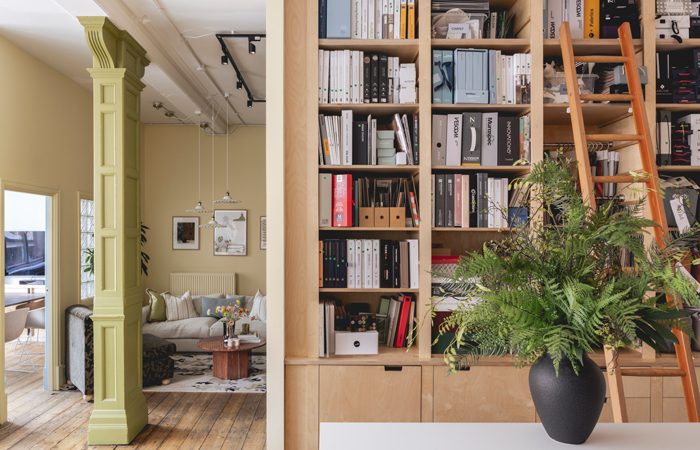
As a result, they keep the use of conflicting scents to a minimum in this space, so as not to interfere with any scent profiles they are creating for client schemes. In the main office area though, they frequently turn to Amber, Sandalwood and Patchouli to calm the mind and promote concentration. When working with clients, Jolie collaborate with a sound designer to create soundscapes that enhance and integrate within their overall design scheme and shape the experience for guests moving through a space. For their own office, Jolie have curated a bespoke playlist to serve as a working accompaniment throughout the day, providing an ambient soundtrack that uplifts and inspires creativity.
Sustainability
Jolie is committed to creating spaces that foster positive attitudes, encourage sustainable behaviours and build up communities, and were keen to ensure the values they apply to all client projects were also at the heart of their own office redesign.
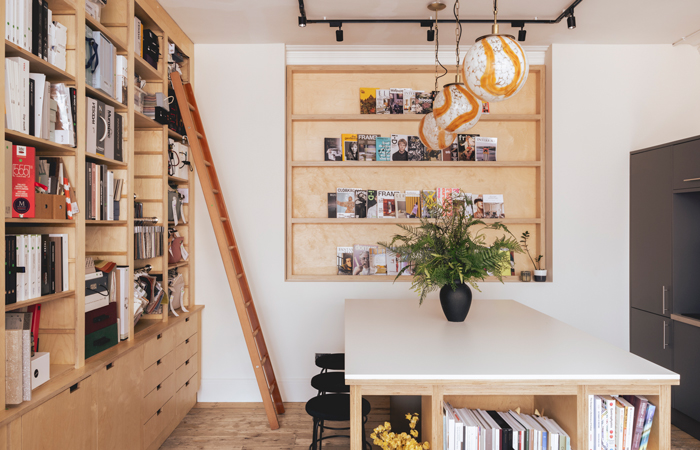
The bespoke joinery at the front of the studio space was designed in-house to be completely removable, so that it can be transported to a new space should Jolie ever relocate in the future; extending the lifespan and sustainability credentials of this purpose-build piece. Several of the seating options remain from before the redesign, and have been reupholstered to give them a new lease of life. In the same vein, new shades have been added to old lamp bases as a creative way of designing something completely unique for the space.
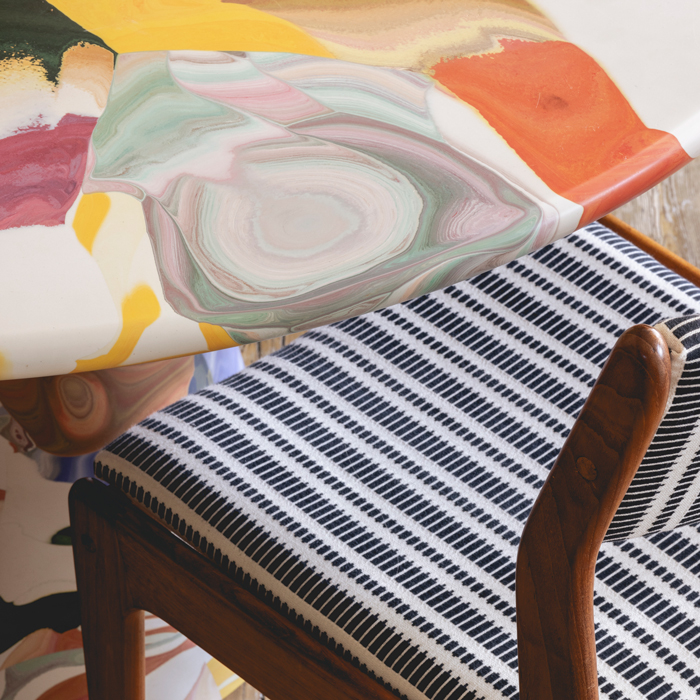
The Melting pot table by Dirk van der Kooij gives a third life to recycled plastic prototypes and colour tests from the Kooij studio. As such, each piece is a one-off interaction between intuition, material, and chance.




